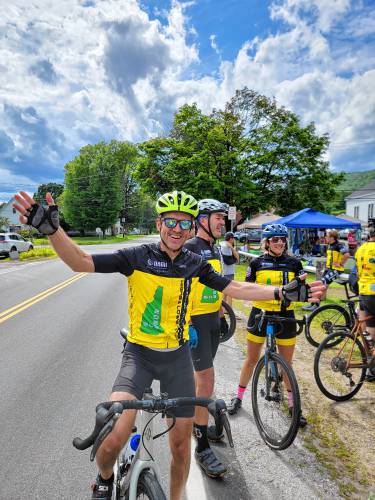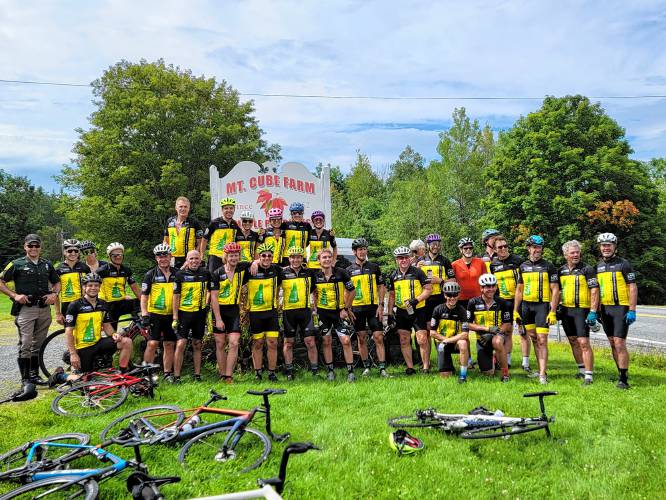Bike tour looks to combat mental illness stigma
| Published: 08-04-2024 12:00 PM |
In one way or another, everybody has seen the impact of mental illness.
In 2020, at the height of the COVID-19 pandemic, the truth in that became as clear as ever to Tom Dearborn. Not one to sit around and let the world work out its own problems, Dearborn turned to his oldest friends. Members of his 1986 class at Plymouth High — with a few characters sprinkled in from Plymouth State — bent their heads together, and four years later, the Highs & Lows Tour is in perennial bloom.
“I think it’s an antidote to loneliness,” said communications director Marybeth Bentwood. “You come together, and there’s this space to do something like this, it feels incredibly meaningful and impactful.”
The bicycle tour, which had its inaugural run in 2022, offers a series of bike routes that range between 22 and 100 miles, all with the mission to gather the people of New Hampshire for open dialogues about mental illness, promote outdoor activity and raise funds and awareness for the New Hampshire chapter of the National Alliance on Mental Illness, or NAMI. This year, the Highs & Lows Tour will take place Aug. 10 in Holderness, beginning at the gateway of the Pemi-Baker Valley and ending at the Holderness School. Though some of the routes might require a seasoned biker, Dearborn and his co-founders strive to make the event as inclusive as possible.
“People that haven’t ridden their bike in years can get out there and ride with us,” he said.
“Doing something physically, that changes the chemistry in your body, changes how you see each other and support each other, and get through hard things like a 20-mile bike ride,” Bentwood said.
Dearborn has a demanding career in sales, but he has refused to let that get in the way of his bike event. For the tour’s other founders, it’s the same story.
“There’s no not doing this,” said Robert Cass, the vice chair. “If not me, then who else is going to tell the story? … There are so many other things I can scrape away that are less meaningful than this.”
Article continues after...
Yesterday's Most Read Articles
 Surplus seller Ollie’s enters New Hampshire, opens in Belmont
Surplus seller Ollie’s enters New Hampshire, opens in Belmont
 Riverbend to close adult mental health housing facility in Concord due to funding challenges
Riverbend to close adult mental health housing facility in Concord due to funding challenges
 Massachusetts man faces DWI charges after crash on I-93 in Hooksett
Massachusetts man faces DWI charges after crash on I-93 in Hooksett
 City officials reject the work of an outside consultant hired to lead Concord’s diversity initiatives
City officials reject the work of an outside consultant hired to lead Concord’s diversity initiatives
 Man who wandered away from Mt. Washington summit found dead after long search
Man who wandered away from Mt. Washington summit found dead after long search
That sense of urgency fuels the 14-person Highs & Lows team for nighttime meetings that produce things like Kona Ice trucks, a plan for each bike route and thousands of dollars in fundraising for NAMI. Last year, Dearborn spearheaded an effort that garnered $30,000, but this year, his goal is $100,000.
Money, however, ranks low in the tour founders’ list of priorities. First and foremost, Dearborn, Cass, Eric Skinner and Patricia Marsden seek to destigmatize mental illness on their home turf.
Skinner, CFO of the bike tour, likened the stigma around mental illness to a cast that nobody will sign. To allow open dialogue about personal struggles with mental illness would mean finally picking up a marker and signing the cast on a neighbor’s broken arm. With the Highs & Lows Tour, Skinner sees the beginning of a community’s decorated cast.
“The ripple effect is massive,” he said. “Just having that single conversation with that one individual that comes one year, could make the difference in saving somebody’s life.”
Mental health, when the four founders were growing up in the 1970s and ‘80s, did not stand out as the hot-button topic that it does today, and the effect of that lingers. Skinner’s father used to tell him that “real men don’t cry” — not an unusual sentiment, back then.
Now, even though the conversation has become drastically better than it once was, rates of suicide and depression remain high, and illnesses persist. The Monitor published a report in April that indicated a declining rate of suicide in New Hampshire, but the state’s rate still ranks among the highest in the nation, where suicide is a leading cause of death already. Susan Stearns, executive director of NAMI New Hampshire, estimates over 40,000 people are affected by Mental Illness in the Granite State.
“If nothing else, let’s get a community where we can talk about this,” Skinner said.
Marsden, DEI officer for the tour and a reverend in the United Church of Christ, talks to people struggling all the time. She entered ministry expecting to spend most of her time talking about theology; she actually spends a lot of it talking about mental health. Largely because of the nature of her congregation — the United Church of Christ focuses on inclusivity — Marsden listens to stories of internal struggle and distress nearly every day. Often, her congregants are afraid to talk to anyone else, or can’t find anyone else, or can’t afford it.
“There’s so much of a lack of services, and when someone is very mentally ill, to orchestrate the process of finding a service is too difficult,” she said.
For Cass, the devastation caused by untreated mental illnesses became clear as a child, when he lost his mother to suicide. His years in the U.S. Navy exposed him further to people struggling with depression and the effects of trauma (Dearborn said Cass is “more passionate about this cause than anyone you’ll ever meet”). For Skinner, the critical point was his daughter’s attempted suicide. More than anything, it made him angry, as he realized just how limited access is to mental health resources in New Hampshire.
“That made me really motivated to say, our officials, our government are — I am — not doing what we need to do,” Skinner said.
The tour founders do believe in NAMI, however, as a powerful force to bring necessary mental illness resources to the state. NAMI casts a wide net in its work, including working on all sorts of different mental illnesses and striving to increase access to and the effectiveness of resources for everyone who might need them.
“My hope and dream is that in my lifetime, I see a decrease in stigma,” Marsden said. “If the stigma is decreased, support mechanisms are going to increase.”
In just two tours, Dearborn, Skinner, Cass and Marsden have all seen their bicycling event change lives. This year, they’re looking for a record community turnout to send ripples of support as far and wide as they can go.










 New Hampshire committee seeks to prevent domestic fatalities like murder-suicide in Berlin
New Hampshire committee seeks to prevent domestic fatalities like murder-suicide in Berlin ‘A little piece of everything I like’: New Pittsfield barbershop brings more than a haircut to downtown
‘A little piece of everything I like’: New Pittsfield barbershop brings more than a haircut to downtown NH judge decides to pause Trump’s birthright citizenship order
NH judge decides to pause Trump’s birthright citizenship order Canterbury honors ‘real heroes’ with updated Military Veterans’ Project
Canterbury honors ‘real heroes’ with updated Military Veterans’ Project
